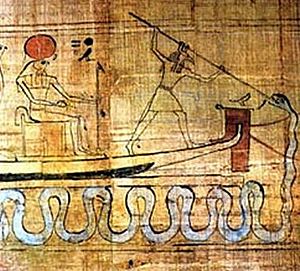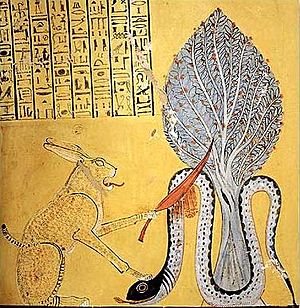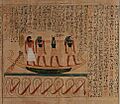Apophis facts for kids
Quick facts for kids Apophis |
|
|---|---|

A depiction of Apophis based on the depiction in the tomb of Ramesses I.
|
|
| Abode | Duat |
| Symbol | Snake |
| Texts | Spells of Coming Forth by Day |
| Personal information | |
| Parents | None, Neith (in some myths) |
| Siblings | None, Ra (in some myths), Sobek (in some myths) |
Apophis, also known as Apep, was a powerful and feared god in ancient Egyptian beliefs. This deity represented darkness and chaos. Apophis was seen as the greatest enemy of light and order. The sun god Ra brought light to the world. Because of this, Ra was Apophis's main opponent.
Contents
Apophis: The Giant Serpent of Chaos
Apophis was known as the "Enemy of Ra" and "Lord of Chaos." This was because Ra was the sun god, bringing light and keeping the world in order. Apophis was everything Ra was not.
What Apophis Looked Like
Ancient Egyptians imagined Apophis as a huge snake or serpent. They called him the "Serpent from the Nile" or "Evil Dragon." Some stories said Apophis was about 16 yards long. That's like the length of two school buses! His head was sometimes described as being made of flint, a very hard stone.
One of the earliest images of Apophis might be on an ancient bowl. This bowl, from around 4000–3550 BCE, shows a snake. It is painted with other animals, and it seems to be an enemy of a god. Many believe this snake represents Apophis.
Where Apophis Came From
Myths tell different stories about how Apophis came to be. Some say he was born after Ra, perhaps from Ra's own creation. Another myth suggests Apophis came from the spit of the goddess Neith. This happened when she was in the first waters of creation. Her spit then turned into a massive snake.
However, most Egyptians believed Apophis had always existed. He was thought to live in the dark, chaotic waters that were there before the world was made.
The Daily Battle with Ra
Ancient Egyptians believed Apophis tried to stop the sun god Ra every single day. Ra traveled across the sky in his sun boat. Apophis would try to attack Ra's boat, especially at sunset and just before dawn. If Apophis succeeded, the sun would not rise. This would plunge the world into eternal darkness and chaos.
Apophis was said to live in the Duat, the land of the dead. He was sometimes called the "World-Encircler" because he could appear in many places. His terrifying roar was believed to make the underworld shake. Some myths said Apophis was trapped in the underworld. This was either because Ra had defeated him before, or because he was too evil to be free.
Ra was not alone in these battles. Many gods helped him. Set, the god of storms and deserts, was a strong defender. He would often fight Apophis directly. The movements of Apophis were sometimes blamed for earthquakes. His struggles with Set were thought to cause thunderstorms. In one famous story, Ra even transformed into a giant cat to defeat Apophis with a knife.
How Egyptians Protected Themselves
Ancient Egyptians believed their prayers and rituals helped Ra defeat Apophis every night. Priests and worshippers performed many ceremonies. These were meant to keep Apophis away and help Ra continue his journey across the sky.
The Ritual of Overthrowing Apophis
One important yearly ceremony was called the Ritual of Overthrowing Apophis. During this rite, priests would create a model, or effigy, of Apophis. They believed this model held all the evil and darkness from Egypt. Then, they would burn it. This ritual was meant to protect everyone from Apophis's evil for the coming year.
Spells and Guides
Egyptian priests used special guides called The Books of Overthrowing Apep. These books contained detailed instructions for fighting Apophis. They described symbolic actions to weaken and destroy the serpent. These actions included:
- Spitting on Apophis
- Stepping on Apophis with the left foot
- Using a lance to strike Apophis
- Tying up Apophis
- Using a knife to strike Apophis
- Setting Apophis on fire
These guides also gave instructions for making small wax models or drawings of Apophis. People would then perform symbolic acts on these models, like spitting on them or burning them. They would also recite special spells. This was all done to help Ra defeat Apophis. Egyptians were careful to always include another god in any image of Apophis. This was to show that the monster was controlled and could not gain power.
Protecting the Dead
Apophis was also seen as an "Eater of Souls" in the underworld. This meant the spirits of the dead needed protection from him. So, people were sometimes buried with special spells. These spells were meant to destroy Apophis and keep the deceased safe. Some spells in the famous Book of the Dead also helped protect against this chaos serpent.
Gallery
-
Apophis below the barque of Ra with seven knives, Book of the Dead of Amenemsaouf, 21st Dynasty, Louvre Museum, Paris
-
The hieroglyph for Apophis name showing a serpent stabbed with five knives, Temple of Edfu, Ptolemaic period
-
Ra, in the form of a cat, smiting Apophis with a knife. Papyrus of Hunefer, 19th dynasty
-
Atum facing Apophis , tomb of Ramesses I, 19th Dynasty (c. 1292–1290 BC)
See also
 In Spanish: Apofis (mitología) para niños
In Spanish: Apofis (mitología) para niños
- 99942 Apophis, an asteroid named after the deity
- Apep (star system), a group of stars also named after Apophis
- Apollyon, a similar figure in other mythologies
- Jörmungandr, a giant serpent from Norse mythology
- Leviathan, a sea monster in ancient texts
- Ouroboros, an ancient symbol of a snake eating its own tail
- Python (mythology), a serpent in Greek mythology
- Ancient serpent, a symbolic snake in religious texts








